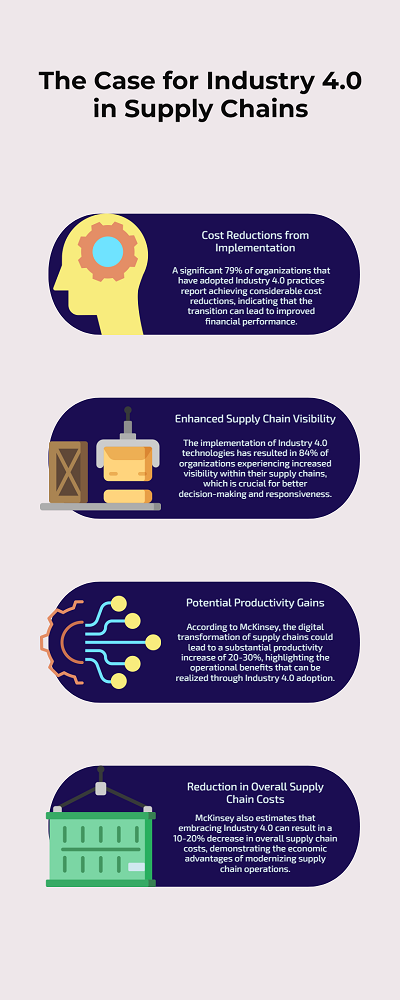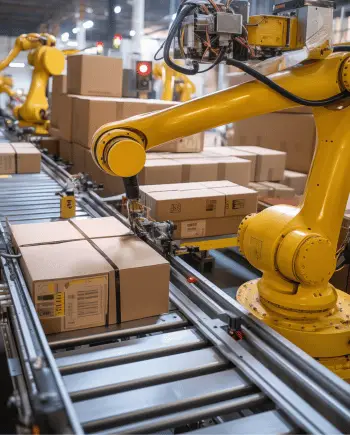Table of Contents
Global supply chains are the lifeblood of modern commerce, connecting producers, manufacturers, distributors, and consumers across continents. However, as global markets evolve, so do the complexities and challenges of managing supply chains. From fluctuating demand patterns to geopolitical disruptions, companies are under increasing pressure to remain agile, efficient, and resilient. Enter Industry 4.0—the Fourth Industrial Revolution—a transformative wave of technological advancements poised to redefine how supply chains operate.
Industry 4.0 represents a fundamental shift in how organizations integrate technology into operations. Supply chain industry players are investing heavily in industry 4.0 to optimize global supply chain operations. Klaus Schwab, founder and executive chairman of the World Economic Forum, aptly stated,
“The Fourth Industrial Revolution is not just about smart and connected machines and systems, but rather a fusion of technologies that blur the lines between the physical, digital, and biological spheres.”
This fusion enables organizations streamline processes, enhance visibility, and improve decision-making in unprecedented ways.
The Case for Industry 4.0 in Supply Chains
The urgency to adopt Industry 4.0 in supply chains is underscored by mounting evidence. A report by Deloitte revealed that 79% of organizations implementing Industry 4.0 have achieved cost reductions, while 84% have noted increased supply chain visibility. Additionally, McKinsey predicts that digital transformation in supply chains could result in a 20-30% increase in productivity and a 10-20% reduction in overall supply chain costs.

Industry leaders are vocal about the transformative potential of Industry 4.0. Jim Tompkins, a supply chain expert, asserts:
“Digital supply chains are no longer a ‘nice-to-have’ but a ‘must-have’ to remain competitive in a hyperconnected world.”
Meanwhile, companies like Amazon are setting benchmarks, using robotics to manage warehousing and IoT for real-time tracking, enabling same-day delivery in over 90 cities globally.
Global supply chain disruptions in recent years—ranging from the COVID-19 pandemic to the Suez Canal blockage—have demonstrated the fragility of traditional supply chains. The adoption of Industry 4.0 technologies offers solutions to mitigate such risks. Real-time tracking through IoT, predictive analytics powered by artificial intelligence (AI), and automated warehouse systems driven by robotics are examples of how companies can anticipate disruptions and react proactively.
How to Integrate Industry 4.0 in Supply Chains
Integrating Industry 4.0 technologies into supply chain operations requires a strategic, phased approach that balances technological adoption with business needs. Here’s how it works:
1. Conduct a Comprehensive Assessment
Before diving into technology implementation, evaluate your current supply chain capabilities and identify gaps.
- Analyze Pain Points: Identify areas of inefficiency, such as delays, poor visibility, or high operational costs.
- Assess Technology Readiness: Evaluate existing infrastructure and determine whether it can support advanced technologies like IoT or AI.
- Benchmark Against Industry Leaders: Study how competitors or industry leaders have integrated Industry 4.0 and adapt best practices.
2. Define Clear Objectives
Set measurable goals that align with your business strategy and justify the investment.
Examples:
- Improve inventory accuracy by 95%.
- Reduce order lead times by 20%.
- Enhance demand forecasting accuracy by 30%.
Objectives should focus on measurable outcomes, such as cost reduction, efficiency gains, or improved customer satisfaction.
3. Invest in Foundational Technologies
Building a digital supply chain starts with selecting the right Industry 4.0 technologies. Here are key technologies to consider:
- IoT (Internet of Things): Use sensors for real-time tracking of goods and monitoring equipment health.
- AI and Machine Learning: Implement AI-driven tools for demand forecasting, route optimization, and inventory management.
- Automation and Robotics: Introduce robotic systems for warehouse automation to enhance efficiency.
- Blockchain: Use blockchain to ensure transparency and traceability across supply chain operations.
- Digital Twins: Create virtual replicas of supply chain processes to simulate and optimize operations.
4. Develop a Phased Implementation Plan
Introduce technologies incrementally to manage costs and reduce operational disruptions.
Phased Approach:
- Pilot Testing: Start with a small-scale pilot to test the technology’s effectiveness. For example, test IoT sensors in one warehouse before scaling across the network.
- Scale Gradually: Roll out technologies across more locations or departments once pilot results validate the investment.
- Continuous Monitoring and Optimization: Monitor the performance of new technologies and fine-tune processes for optimal results.
5. Build a Skilled Workforce
Technology alone cannot drive transformation; you need a workforce skilled in managing and operating Industry 4.0 tools.
Offer training on data analytics, IoT, and AI tools. Also, partner with tech providers for customized training sessions, and encourage innovation and digital adoption at all levels of the organization.
6. Enhance Data Integration and Cybersecurity
Industry 4.0 technologies rely heavily on data, making integration and security paramount.
Data Integration:
- Implement data integration platforms to connect disparate systems and facilitate real-time data sharing.
- Standardize data formats to ensure seamless communication between devices and software.
Cybersecurity Measures:
- Deploy advanced security protocols, such as encryption and multi-factor authentication.
- Regularly update software and conduct security audits to prevent breaches.
7. Collaborate with Technology Partners
Partnering with technology providers or consulting firms can accelerate adoption. Select vendors with proven expertise in Industry 4.0 implementations. Also, consultants can help design custom solutions tailored to your supply chain needs.
8. Measure and Refine Performance
Track key performance indicators (KPIs) to evaluate the impact of Industry 4.0 technologies.
KPIs to Monitor:
- Order fulfillment time.
- Inventory turnover rate.
- Forecasting accuracy.
- Cost-to-serve metrics.
Feedback Loop:
- Use insights from performance metrics to refine strategies.
- Engage stakeholders for continuous improvement suggestions.
Companies Utilizing Industry 4.0 for Supply Chain Success
1. Amazon
Amazon has long been a pioneer in supply chain innovation. The e-commerce giant uses a combination of robotics, IoT, and machine learning to optimize its fulfillment centers and delivery operations.
Technologies Implemented:
- Robotics: Amazon employs over 520,000 robotic units in its warehouses. These robots assist with picking, sorting, and packing items, significantly reducing manual labor and processing times.
- IoT: Real-time sensors track inventory levels and monitor the location of items across the supply chain.
- AI and Machine Learning: Predictive algorithms forecast demand and optimize inventory placement within warehouses, reducing delays.
Results Achieved:
- Amazon reduced order-to-ship times by over 20%, enabling services like Prime same-day delivery in select regions.
- The company improved inventory accuracy by nearly 99.9%, minimizing stockouts and excess inventory.
- During peak seasons like Black Friday, Amazon’s fulfillment centers process over 1 million packages daily, thanks to robotic and IoT-driven automation.
2. Siemens
Siemens, a leader in industrial automation, has integrated Industry 4.0 principles into its manufacturing and supply chain operations through digital twin technology.
Technologies Implemented:
- Digital Twins: Siemens creates virtual replicas of its manufacturing processes and supply chain systems to simulate, predict, and optimize operations.
- AI and Data Analytics: Data from production lines is analyzed to identify bottlenecks and improve efficiency.
- IoT Sensors: Sensors monitor equipment health, enabling predictive maintenance.
Results Achieved:
- Siemens improved production efficiency by 30%, reducing downtime through predictive maintenance.
- The company reduced time-to-market for new products by 50%, as virtual simulations identified potential issues early in the design phase.
- Energy consumption across their factories decreased by 20%, supporting sustainability goals.
Future Trends in Industry 4.0 and Supply Chain Optimization
- Autonomous Supply Chains: The development of self-regulating supply chains that utilize AI and machine learning to make decisions without human intervention is on the horizon.
- Sustainable Practices: There is a growing emphasis on integrating sustainable practices within supply chains, utilizing Industry 4.0 technologies to reduce environmental impact.
- Advanced Analytics: The use of big data analytics is expected to increase, providing deeper insights into supply chain operations and enabling more informed decision-making.
Conclusion
The benefits of Industry 4.0 in supply chains are clear: improved efficiency, enhanced visibility, better risk management, and increased customer satisfaction. However, adopting these technologies requires strategic planning, investment, and a willingness to embrace change.













